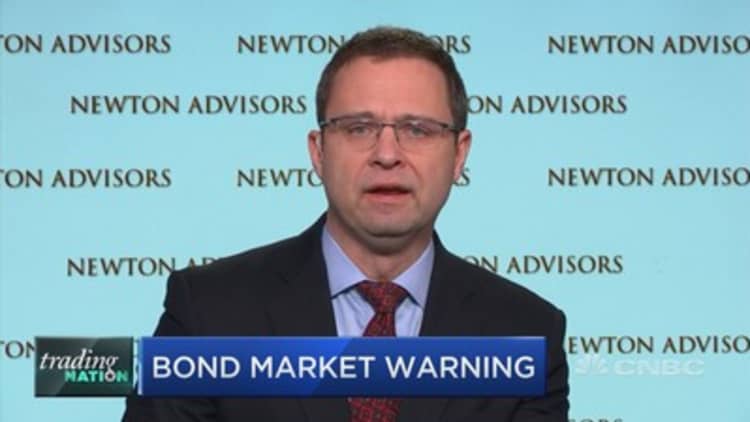
The bond rally stretches on.
The 10-year yield cracked below 1.6% earlier this week as investors rushed into safe haven bonds. Bond yields move inversely to prices.
Mark Newton, founder of Newton Advisors, forecasts an even bigger bid for bond prices as investors press pause on recent stock market gains.
"Near term this [yield] breakdown is pretty serious," Newton said Thursday on CNBC's "Trading Nation," noting that it began a week ago when the stock market peaked. "Near term I can see further selling pressure in yields and/or buying of Treasurys thinking that yields pull back and really test those lows that we were seeing back last September."
The 10-year yield fell close to the 1.4% mark in September. That had been its lowest level since 2016.
Lower yields could put the most pressure on one S&P 500 sector, Newton warned.
"This should have an effect on what happens with financials," he said. "There tends to be a pretty good correlation with what yields and the yield curve do with what the financial space does so given it is almost 13% of the S&P, that could represent a pretty significant headwind."
Lower yields affect how much interest a lender can charge. Part of the yield curve — the gap between the 10-year and 3-month yields — inverted Friday for the second time this week, sending what many see as a recession signal. Any economic weakness would also impact banks' performances.
Gina Sanchez, CEO of Chantico Global, said a broader bond rally could be sending a signal of economic distress on the horizon.
"What's more concerning is not just that the 10-year has fallen but that the entire long end has fallen with it so the 10-year all the way out to the 30-year which tells a story of sort of concerns around growth. If this were really kind of one isolated incident around fear around the coronavirus you would likely only see the one point moving," Sanchez said during the same segment.
The U.S. 30-year yield has fallen to just above 2%. That is its lowest level since October.
"If you listened to the [Federal Reserve this week] they moderated their stance on growth. They went from strong to moderate growth. And that's because you know we are still seeing declining global trade volumes, we're seeing declining business investment, all of these numbers aren't as strong as they should be and most economists are expecting a slowdown," said Sanchez.
The Fed kept interest rates unchanged at its meeting this week. It was the second gathering with no change to the federal funds rate.





